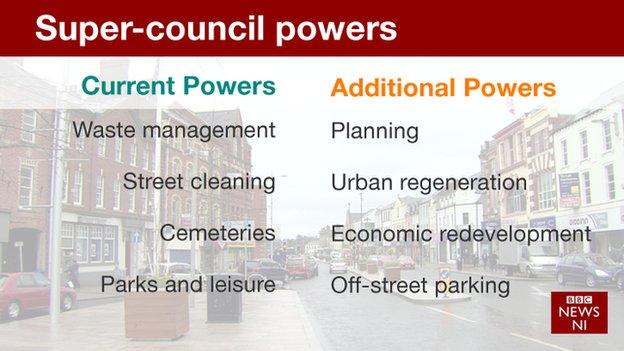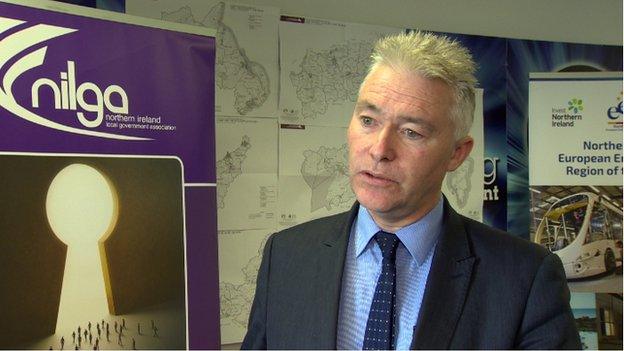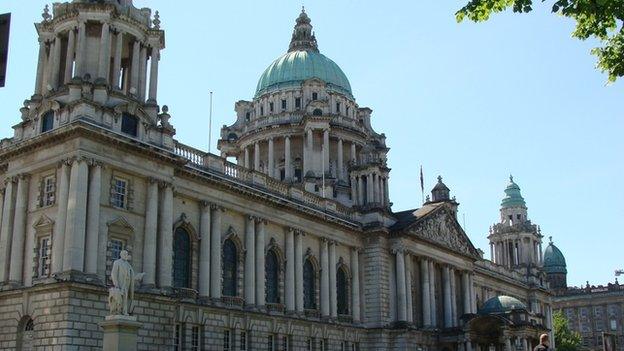Super-councils: What new powers will NI's new local government partners have?
- Published

A happy couple were filmed availing of one of the services that local councils provide - marriage
It seemed appropriate that a wedding party should arrive at Craigavon Civic Centre in County Armagh as I and my camera operator were filming interviews about the shake-up of Northern Ireland councils.
After all, Wednesday 31 March will mark a "big day" that is all about new partnerships.
Life in local government will never be the same again.
The happy couple graciously agreed to allow us to film them partaking of one of the services that councils provide - marriage.
Of course, local authorities carry out many less glamorous functions too.
Waste management, cemeteries, leisure centres to name a few.
Their duties tended to be summed up as "emptying the bins and burying the dead".
But now they are taking on some important new powers.
Urban regeneration
The 11 super-councils will take most planning decisions.
Only those deemed to be "regionally significant" will be retained by the environment minister.
In a year's time, the local authorities will get powers for urban regeneration.

Tied to that, they will have responsibility for local economic development and tourism.
The super-councils will also take over more than 300 off-street car parks from the Department for Regional Development.
The idea is that councils will be able to take the lead in shaping towns, cities and rural areas.
'More prosperity'
One example being held up is that of Manchester, where the council has led a striking city regeneration programme in recent years.
The chief executive of the Northern Ireland Local Government Association (NILGA), Derek McCallan, is "unapologetic" about his enthusiasm.
"It's a very compelling change for the average ratepayer and for the average politician. But there'll be no such thing as an average council, because there'll be no poverty of ambition from them. You can be sure of that," he said.

Derek McCallan said the changes would mean that local councils could become real drivers of economic development in Northern Ireland
According to Mr McCallan, similar models of local government elsewhere in the world have brought more prosperity.
"In places like the Netherlands, about 88% of development takes place in towns and cities driving their own development. Here, councils will now be able to be a real driver of economic development, rather than a consultee or a recipient of a grant."
He, and others at the heart of the transition, believe it will take a few years for the new councils to bed-in and get used to using their new powers effectively.
Most politicians will surely agree that working to improve local economies should be high on their priority list.
Controversy
But some political disagreement in council chambers is inevitable.
Already, there has been a row in the Mid-Ulster super-council, when a council meeting in "shadow" format resulted in a ban on the sale of poppies or Easter lilies on council property.
And there has been controversy over Newry, Mourne and Down Council's decision to place the Irish language above English on its signs.
But on the eve of the handover, the super-councils are emphasising the potential positives rather than the possible pitfalls.
On Wednesday, there will be little, if any, change to council services - the public will probably not see much to suggest that a revolution in local government has begun.
It may take several years before we see if this huge change in the way Northern Ireland is run will have a truly transformative effect.
- Published30 March 2015
